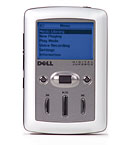Further details of the second version of the iTunes software and service are becoming clearer and as you would expect with Apple, they are not only interesting, but steps forward in the use of digital audio.
Audio books and Round Tripping
Apple have signed an exclusive, multi-year deal with audible.com to sell five thousand of their spoken books, equating to over twenty thousand hours of content.
Once the audio-books have been downloaded, the listener will be able to listen to it both on their computer and their iPod – features that were available on version one of the service. The clever part is that you can transfer your listen point, an audio bookmark, from computer to iPod and back again. This is best illustrated with an example – you starts listening to the book on your Mac, you then need to leave you computer, so transfer the audio-book to your iPod. The playback will continue from the point you left it at on the computer. When you return from travelling to your computer, hook up your iPod and continue listening from the point reached on your iPod. Apple have called this feature Round Tripping.
Round tripping is interesting for a number of reasons. Apple have only been able to quickly introduce a new feature like this into the market as they control both the client software on the computer, and the portable playback device, iPod, and can make the required changes to both. It will be interesting to see if Apple declare an open standard on this, to enable other playback devices to take advantage of this feature. We suspect they’ll be keeping this to themselves, at least for the while.
While Round tripping is nifty when listening to books, it becomes potentially far more interesting when it is applied to music, consumer electronic equipment and wireless connections – giving a listener the ability to have a “Continuous Music Experience” as they move from work, to the car and to home.
Enabling the “giving” of digital music
To enable children who do not have their own credit card to use the service, there is a patent-pending online “Allowance” feature which allows parents to automatically deposit funds into their children’s accounts – very smart.
People will also be able to give someone a gift certificate to spend in the online store. By signing on to their iTunes account, they can gift between $10-$200 to a person, who might not even currently have an iTunes account. The recipient receives an email telling them of the present and by clicking on a link, can start to use it to access content.
Digital Lifestyles:Apple Adds Windows Support to iTunes
Apple iTunes
 Both of the models work as music players and portable storage devices, enabling users to load content on to them. They also have a built-in microphone, giving the ability to record conversations – this can only be achieved by using an add-on for the iPod.
Both of the models work as music players and portable storage devices, enabling users to load content on to them. They also have a built-in microphone, giving the ability to record conversations – this can only be achieved by using an add-on for the iPod.